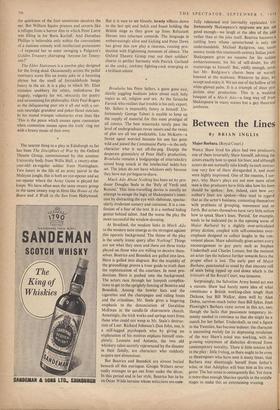Between the Lines
WHILE Shaw lived his plays had two producers, one of them invariably Shaw himself, advising the actors exactly how to speak his lines; and although actors do not normally take kindly to such instruc- tion very few of them disregarded it, and most were highly impressed. One of the reasons, I sus- pect, why Shaw's plays are not now more often seen is that producers have little idea how his lines should be spoken : few, indeed, care how any author's lines are spoken—they tend to regard that as the actor's business, contenting themselves with problems of grouping, movement and so forth. But actors themselves have very little notion how to speak Shaw's lines. 'Period,' for example, tends to be indicated (as in the opening scene of Major Barbara) by a slightly over-articulated prissy diction, coupled with self-conscious over- emphasis designed to collect laughs in the con- venient places. Shaw admittedly gives actors every encouragement to guy parts such as Stephen Undershaft and Charles Lomax; but the moment an actor tips the balance further towards farce the proper effect is lost. The early part of Major Barbara, punctuated as usual by that staccato roll of seats being tipped up and down which is the leitmotiv of the Royal Court, was tiresome.
Surprisingly, the Salvation Army hostel act was a success. Shaw had barely more idea of what constitutes a British working-class tough than Dickens, but Bill Walker, done well by Alan Dobie, survives much better than Bill Sykes. Joan Plowright's Barbara came across in this act, too; though she lacks that passionate temporary in- tensity needed to convince us that she might be a match for her father. Undershaft, so real a figure in the Twenties, has become tedious: the character is interesting mainly for its depressing revelation of the way Shaw's mind was working, with its growing enjoyment of dialectics divorced from contemporary morality. There is little tension left in the play : little feeling, as there ought to be even to theatregoers who have seen it many times, that Barbara may disentangle herself from father's wiles, or that Adolphus will beat him at his own game. The last scene is consequently flat. Yet there is more than enough Shavian sparkle in the middle stages to make this an entertaining evening.


































 Previous page
Previous page